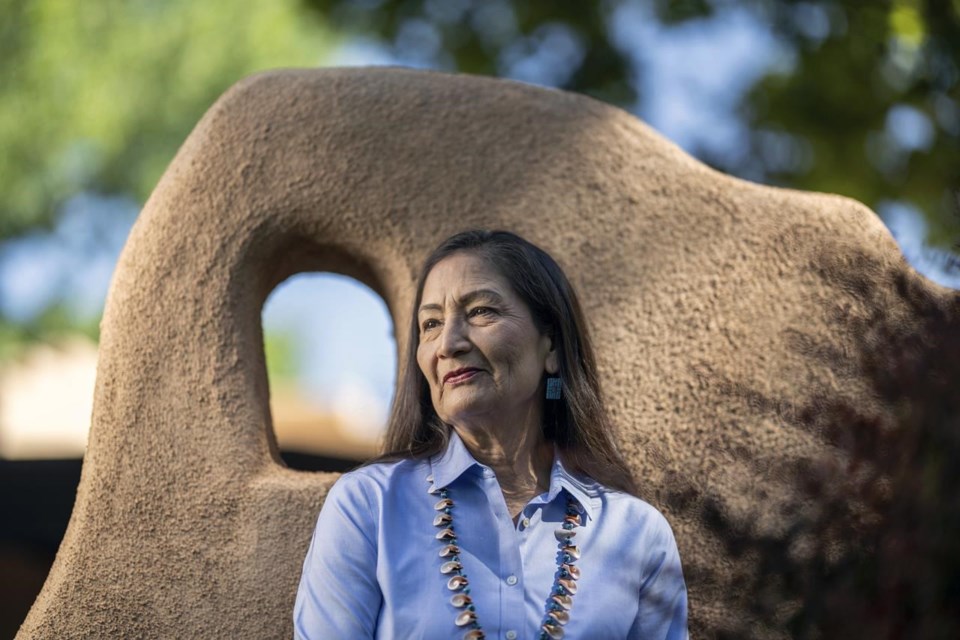WASHINGTON — Canada and the United States are working together through "a period of healing" from the open wounds of residential schools and missing and murdered Indigenous women and girls, U.S. Interior Secretary Deb Haaland says.
Haaland, from Laguna Pueblo in New Mexico and the first-ever Native American member of the U.S. cabinet, made the comments Wednesday during a multi-day visit to Ottawa, her first since taking on the job in 2021.
She has championed efforts south of the border to investigate the tragic heritage of residential schools, known as boarding schools in the U.S., and to confront the issue of persistent and unsolved violence against Indigenous people.
Canada has been wrestling with these issues for years, but they got little attention in the U.S. before 2018, when Haaland and Sharice Davids from Kansas became the first Native American women to be elected to the House of Representatives.
"I think this is a period of healing," said Haaland, whose grandparents were both forced to attend boarding schools in the U.S.
"What one country does, I think the other can learn from, and so I think we're in a period now in the United States of really finding out and documenting the history that we have had with respect to Indian boarding schools."
Shortly after taking on her cabinet post, Haaland cited the discovery of what are believed to be unmarked graves at a former residential school near Kamloops, B.C., when she launched an investigation of the U.S. boarding school system.
She called the timing a "coincidence," but acknowledged that Canada's own efforts have been influential in shaping the direction of that probe, which is still ongoing.
To date, it has found marked and unmarked burial sites at the locations of 53 former U.S. schools, and estimated at least 500 students died at 19 of 408 federally supported sites identified to date.
Those numbers are only expected to grow as the investigation continues. A second volume of the department's report is still to be released.
For Haaland, it's all part of an ongoing process of confronting and moving past the country's troubled history of how Indigenous Peoples have been treated.
"I think this is a period of healing," she said.
"Intergenerational trauma has plagued our communities not only with the boarding school issue, but with missing and murdered Indigenous people. That has been happening since colonization first started on this continent."
The main event for the visit is the fifth meeting of a trilateral working group on the issue of missing and murdered Indigenous women and girls, a project that launched in 2016 between the U.S., Canada and Mexico.
David Cohen, the U.S. ambassador to Canada, is hosting Haaland during her visit. The discussions taking place are just one more example of three close partners pooling their resources to tackle complex problems, he said.
"The problem of violence against Indigenous women and children is not just a Canadian problem, not just a United States problem, it's a continental problem," he said.
"It does not respect national borders (and) it's just essential that Mexico be a part of those discussions as well."
Haaland also cited the Not Invisible Act, a 2019 law she helped sponsor in Congress that allows a broad coalition of experts from law enforcement, government officials, Indigenous elders and family members and survivors to help advise the government on how best to proceed.
"Notice the title of the group is a working group," she said of Thursday's trilateral meeting.
"That means that we're coming together to not only talk about our respective issues about missing and murdered Indigenous women and girls and violence against women and girls, but also to work to find solutions to those issues."
The federal government and Indigenous communities in Canada should be heralded for ensuring both issues were pushed to the front of public discourse, said Bryan Newland, the Department of the Interior's assistant secretary for Indian affairs.
"Canada's journey to tell its own history, and develop action plans based upon that, predates the work that we're doing here in the United States," Newland said.
"That's really a credit to the people in Canada, both in the First Nations as well as at the national level, to really accept the challenge of raising awareness and being accountable for that and also planning a path forward."
On the U.S. side, Haaland has been spearheading efforts to drum up federal money for tribal law enforcement, resources for victims and tribal courts, as well as housing and jobs programs, Newland said.
The secretary has also established a special law enforcement unit under the U.S. Bureau of Indian Affairs designed specifically to streamline agency co-operation on cases involving missing or murdered people in Indian Country, he added.
This report by The Canadian Press was first published Sept. 6, 2023.
James McCarten, The Canadian Press




